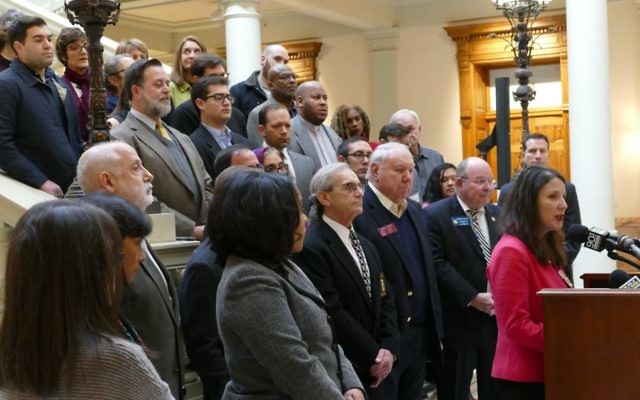Our View: Time for a Hate-Crimes Law
The AJT has been skeptical of the legislation's value, but law enforcement makes the case compelling.

The quest for hate-crimes law in Georgia has lasted so long you couldn’t be blamed for sensing the spirits of Don Quixote and Sancho Panza hovering in the state Capitol on Wednesday, Jan. 3, when Rep. Meagan Hanson, the Anti-Defamation League and the new Coalition for a Hate-Free Georgia announced the latest legislation.
Our state is one of five — along with South Carolina, Arkansas, Indiana and Wyoming — that lack such a law. We had one from 2000 to 2004, but the state Supreme Court correctly threw out Georgia’s statute for being too vague. If you’re going to increase penalties for crimes motivated by a person’s identity, you must specify the protected groups. You can’t simply say, “I know a hate crime when I see it.”
Rising anti-Semitism and other expressions of hate have sparked renewed interest in a hate-crimes law.
Last March, people who gathered at the first event of the Atlanta Initiative Against Anti-Semitism expressed shock that Georgia lacked such a law, and one point of consensus after discussions that day was the need to support efforts to enact hate-crimes legislation. Religious minorities, after all, should be beneficiaries.
The AJT, however, has not supported hate-crimes bills — not because we’re in favor of vandalism and violence based on the victims’ perceived race, religion, nationality, disability, gender, gender identity or sexual orientation, but because we have been unconvinced that such laws do more than make people feel good to have them on the books.
A murder, a rape or an aggravated assault doesn’t need to target a protected group to be despicable and worthy of heavy punishment, and the question of whether an act was motivated by hate can be a distraction from the crime committed.
For example, Dylann Roof killed nine people in a Charleston church in 2015 and deserved to be convicted of murder and sent away for life. But he first was tried and convicted in a federal court to use the federal hate-crimes law. What did that accomplish?
We believe in the principle that to protect liberty, the government should enact the fewest laws possible. If legislation doesn’t have a clear purpose, it shouldn’t be passed, and we never saw a strong argument for a hate-crimes law, beyond the claim that targeted groups feel more threatened without it.
That was the case until Jan. 3.
Two points raised at the Capitol press conference persuaded us to change our position.
First, only six police agencies in Georgia reported any hate crimes in 2016, even though the FBI tries to collect data about them. That’s an absurd refusal to face reality.
Second, Georgia Bureau of Investigation Director Vernon Keenan said that when law enforcement leaders try to emphasize training and reporting on hate crimes, officers just shrug, figuring that if hate crimes were important, there would be a law.
Well, they are important, so there should be a law.
The fact that so many Jewish groups, including the ADL, American Jewish Committee, the Jewish Community Relations Council and SOJOURN, are supporting this legislation says we and other communities need that added protection, and we need our law enforcement officers to take threats seriously.
We therefore urge readers to contact their legislators or visit action.adl.org/georgia-hate-crime-laws and make it clear that this bill is important to you in this election year.



comments